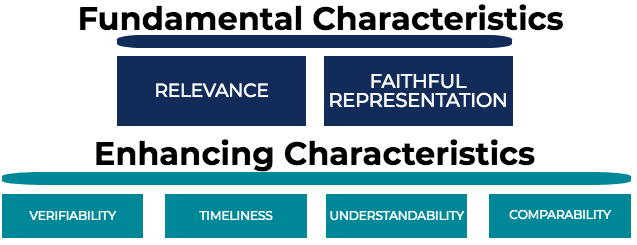Mẹo Which of the following represent the five common characteristics of high quality information?
Kinh Nghiệm về Which of the following represent the five common characteristics of high quality information? 2022
Hoàng Trung Dũng đang tìm kiếm từ khóa Which of the following represent the five common characteristics of high quality information? được Cập Nhật vào lúc : 2022-08-22 00:50:05 . Với phương châm chia sẻ Mẹo về trong nội dung bài viết một cách Chi Tiết 2022. Nếu sau khi tham khảo nội dung bài viết vẫn ko hiểu thì hoàn toàn có thể lại Comment ở cuối bài để Mình lý giải và hướng dẫn lại nha.The fundamental (primary) and enhancing (secondary) qualitative characteristics
Nội dung chính- What are the Qualitative Characteristics of Accounting Information?Fundamental (Primary) Qualitative CharacteristicsEnhancing (Secondary) Qualitative CharacteristicsRepresentational FaithfulnessVerifiabilityUnderstandabilityComparabilityMore ResourcesWhich of the following represents the five common characteristics of highWhat are the characteristics of highWhich of the following represent the information levels in an organization?Which of the following represent the four primary traits that help determine the value of information?
What are the Qualitative Characteristics of Accounting Information?
The demand for accounting information by investors, lenders, creditors, etc., creates fundamental qualitative characteristics that are desirable in accounting information. There are six qualitative characteristics of accounting information. Two of the six qualitative characteristics are fundamental (must have), while the remaining four qualitative characteristics are enhancing (nice to have).

Fundamental (Primary) Qualitative Characteristics
Qualitative characteristics of accounting information that must be present for information to be useful in making decisions:
RelevanceRepresentational faithfulnessEnhancing (Secondary) Qualitative Characteristics
Qualitative characteristics of accounting information that impact how useful the information is:
VerifiabilityTimelinessUnderstandabilityComparabilityWe will look each qualitative characteristic in more detail below.
Relevance
Relevance refers to how helpful the information is for financial decision-making processes. For accounting information to be relevant, it must possess:
Confirmatory value – Provides information about past eventsPredictive value – Provides predictive power regarding possible future eventsTherefore, accounting information is relevant if it can provide helpful information about past events and help in predicting future events or in taking action to giảm giá with possible future events. For example, a company experiencing a strong quarter and presenting these improved results to creditors is relevant to the creditors’ decision-making process to extend or enlarge credit available to the company.
Representational Faithfulness
Representational faithfulness, also known as reliability, is the extent to which information accurately reflects a company’s resources, obligatory claims, transactions, etc. To help, think of a pictorial depiction of something in real life – how accurately does the picture represent what you see in real life? For accounting information to possess representational faithfulness, it must be:
Complete – Financial statements should not exclude any transaction.Neutral – The degree to which information is không lấy phí from bias. Note that there are subjectivity and estimation involved in financial statements, therefore information cannot be truly “neutral.” However, if a company polled 1,000 accountants and took the average of their answers, that would be considered neutral and không lấy phí from bias.Free from error – The degree to which information is không lấy phí from errors.Verifiability
Verifiability is the extent to which information is reproducible given the same data and assumptions. For example, if a company owns equipment worth $1,000 and told an accountant the purchase cost, salvage value, depreciation method, and useful life, the accountant should be able to reproduce the same result. If they cannot, the information is considered not verifiable.
Timeliness
Timeliness is how quickly information is available to users of accounting information. The less timely (thus resulting in older information), the less useful information is for decision-making. Timeliness matters for accounting information because it competes with other information. For example, if a company issues its financial statements a year after its accounting period, users of financial statements would find it difficult to determine how well the company is doing in the present.
Understandability
Understandability is the degree to which information is easily understood. In today’s society, corporate annual reports are in excess of 100 pages, with significant qualitative information. Information that is understandable to the average user of financial statements is highly desirable. It is common for poorly performing companies to use a lot of jargon and difficult phrasing in its annual report in an attempt to disguise the underperformance.
Comparability
Comparability is the degree to which accounting standards and policies are consistently applied from one period to another. Financial statements that are comparable, with consistent accounting standards and policies applied throughout each accounting period, enable users to draw insightful conclusions about the trends and performance of the company over time. In addition, comparability also refers to the ability to easily compare a company’s financial statements with those of other companies.
The qualitative characteristics of accounting information are important because they make it easier for both company management and investors to utilize a company’s financial statements to make well-informed decisions.
More Resources
Thank you for reading CFI’s guide on Qualitative Characteristics of Accounting Information. To keep learning and advancing your career, the following resources will be helpful:
- Audit MaterialityAudited Financial StatementsPublic Company FilingsFinancial Accounting Theory
Which of the following represents the five common characteristics of high
There are five traits that you'll find within data quality: accuracy, completeness, reliability, relevance, and timeliness – read on to learn more.What are the characteristics of high
Characteristics of high-quality information include: Accuracy, Completeness, Consistency, Uniqueness, Timeliness.Which of the following represent the information levels in an organization?
Which of the following represent the information levels in an organization? individual, department, and enterprise.Which of the following represent the four primary traits that help determine the value of information?
Which of the following represent the four primary traits that help determine the value of information? B. Information type, information timeliness, information quality, and information governance. Tải thêm tài liệu liên quan đến nội dung bài viết Which of the following represent the five common characteristics of high quality information?
Post a Comment